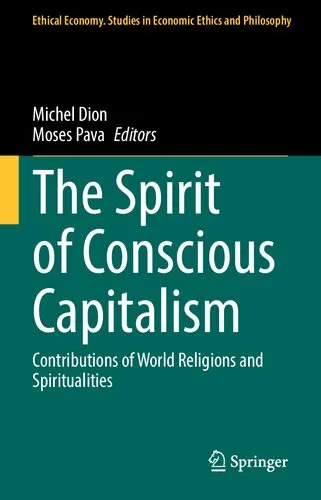The Spirit of Conscious Capitalism: Contributions of World Religions and Spiritualities (Ethical Economy, 63)
4.9
Reviews from our users

You Can Ask your questions from this book's AI after Login
Each download or ask from book AI costs 2 points. To earn more free points, please visit the Points Guide Page and complete some valuable actions.The book "The Spirit of Conscious Capitalism: Contributions of World Religions and Spiritualities" is a profound exploration of the intersection between economic systems and spiritual values. As part of the Ethical Economy series, it delves into how world religions and spiritual traditions can inform and enrich the practice of capitalism, making it more ethical, sustainable, and beneficial for all stakeholders involved. Edited by Michel Dion and Moses Pava, this volume presents a collection of essays and analyses contributed by scholars and practitioners from diverse backgrounds, each offering a unique perspective on how spiritual and ethical principles can shape contemporary capitalism.
Detailed Summary
The book begins by setting the stage for a critical examination of conscious capitalism, which seeks to harmonize profit-making with societal good. It challenges the traditional view of capitalism as solely profit-driven and posits that integrating spiritual insights can lead to a more ethical economic system. The contributors explore various religious and spiritual traditions, including Christianity, Judaism, Buddhism, Hinduism, and Indigenous spiritualities, among others, to uncover how these ancient wisdoms can influence modern economic practices.
A key theme is the idea that spirituality offers not just a moral compass but also practical tools for reimagining capitalism. From promoting ethical leadership and corporate social responsibility to fostering a sense of community and environmental stewardship, the book argues for a multidimensional approach to economic life, enriched by spiritual insights.
Another significant focus of the book is on the concept of interconnectedness, a common thread in many religious teachings. This interconnectedness emphasizes the idea that businesses do not operate in isolation but are part of a larger ecological, social, and economic system. The essays collectively advocate for a shift towards business models that prioritize long-term sustainability and mutual benefit over short-term gains.
Key Takeaways
- Conscious capitalism is not an oxymoron but a feasible and necessary evolution of traditional capitalism.
- World religions and spiritualities provide valuable insights that can shape ethical economic behavior.
- Businesses thrive when they operate with an awareness of their impact on people, planet, and profit.
- Interconnectedness is central to spiritual teachings and crucial for sustainable business practices.
- Long-term success is achieved when companies align their practices with ethical and spiritual principles.
Famous Quotes from the Book
"The spirit of conscious capitalism resides not merely in the quest for profit, but in the aspiration for prosperity shared across communities."
"Religions and spiritualities teach us that the true measure of success extends beyond financial metrics to include the well-being of all stakeholders."
"Incorporating ethical and spiritual values into business revitalizes not just the corporate world but the societies in which they operate."
Why This Book Matters
The significance of "The Spirit of Conscious Capitalism" lies in its potential to ignite change in how we perceive and practice capitalism. In a world grappling with economic disparities, environmental challenges, and social injustices, the book serves as a call to action for rethinking the role of business in society. By drawing on time-honored wisdom from various spiritual traditions, it provides a roadmap for developing economic systems that are not only efficient but also equitable and empathetic.
Furthermore, this book challenges business leaders, policymakers, and academics to consider the broader implications of their decisions and to foster an economy that nurtures human dignity and ecological health. It underscores the possibility that when grounded in spiritual and ethical foundations, capitalism can be a force for good, promoting not just wealth but well-being for all.
This comprehensive volume is essential reading for anyone interested in ethical business practices, sustainable development, and the role of spirituality in modern life. Its diverse perspectives and practical insights make it a valuable resource for inspiring and guiding the next wave of conscious business leaders.
Free Direct Download
You Can Download this book after Login
Accessing books through legal platforms and public libraries not only supports the rights of authors and publishers but also contributes to the sustainability of reading culture. Before downloading, please take a moment to consider these options.
Find this book on other platforms:
WorldCat helps you find books in libraries worldwide.
See ratings, reviews, and discussions on Goodreads.
Find and buy rare or used books on AbeBooks.
1225
بازدید4.9
امتیاز50
نظر98%
رضایتReviews:
4.9
Based on 0 users review
"کیفیت چاپ عالی بود، خیلی راضیام"
Questions & Answers
Ask questions about this book or help others by answering
No questions yet. Be the first to ask!


